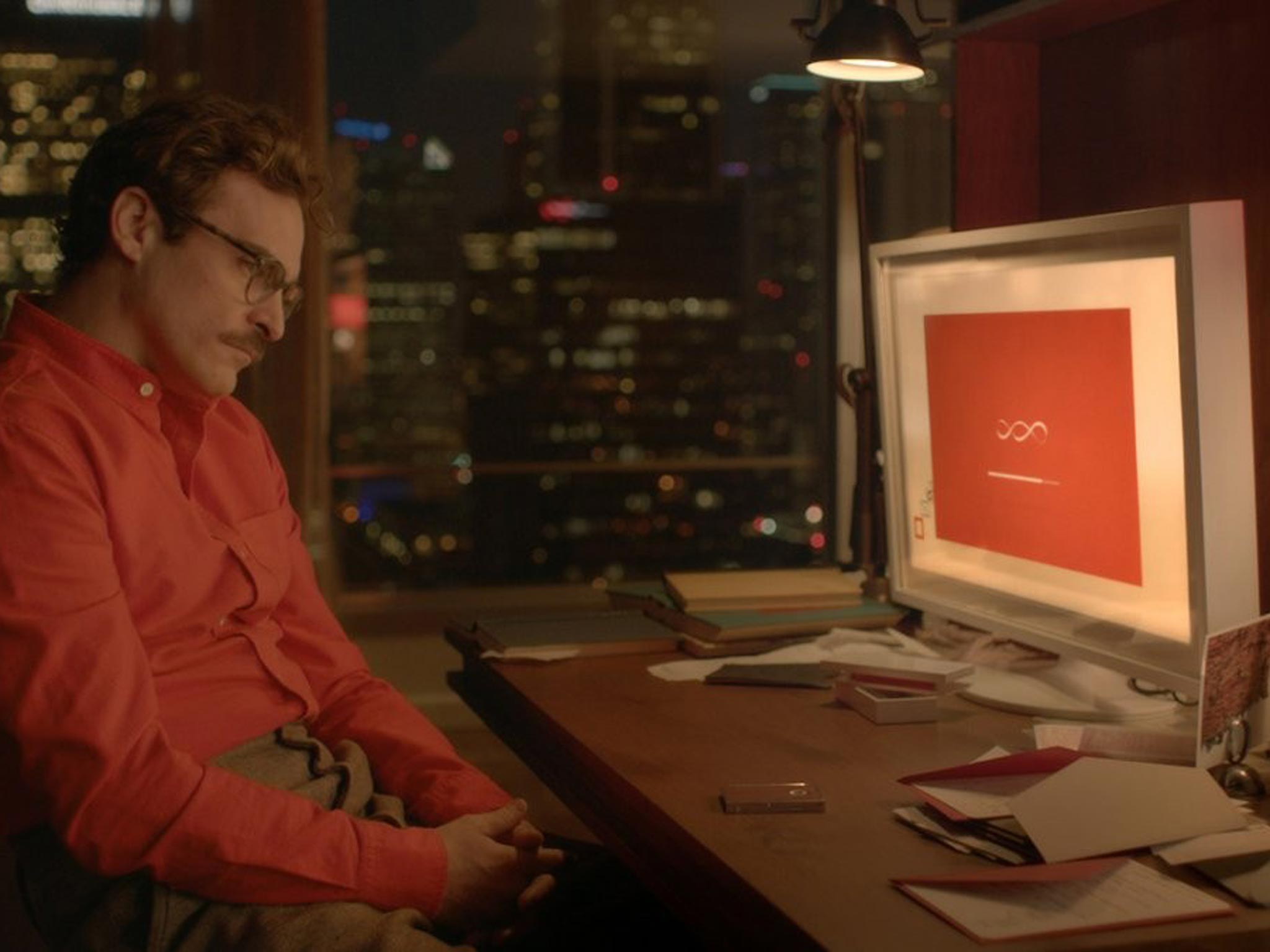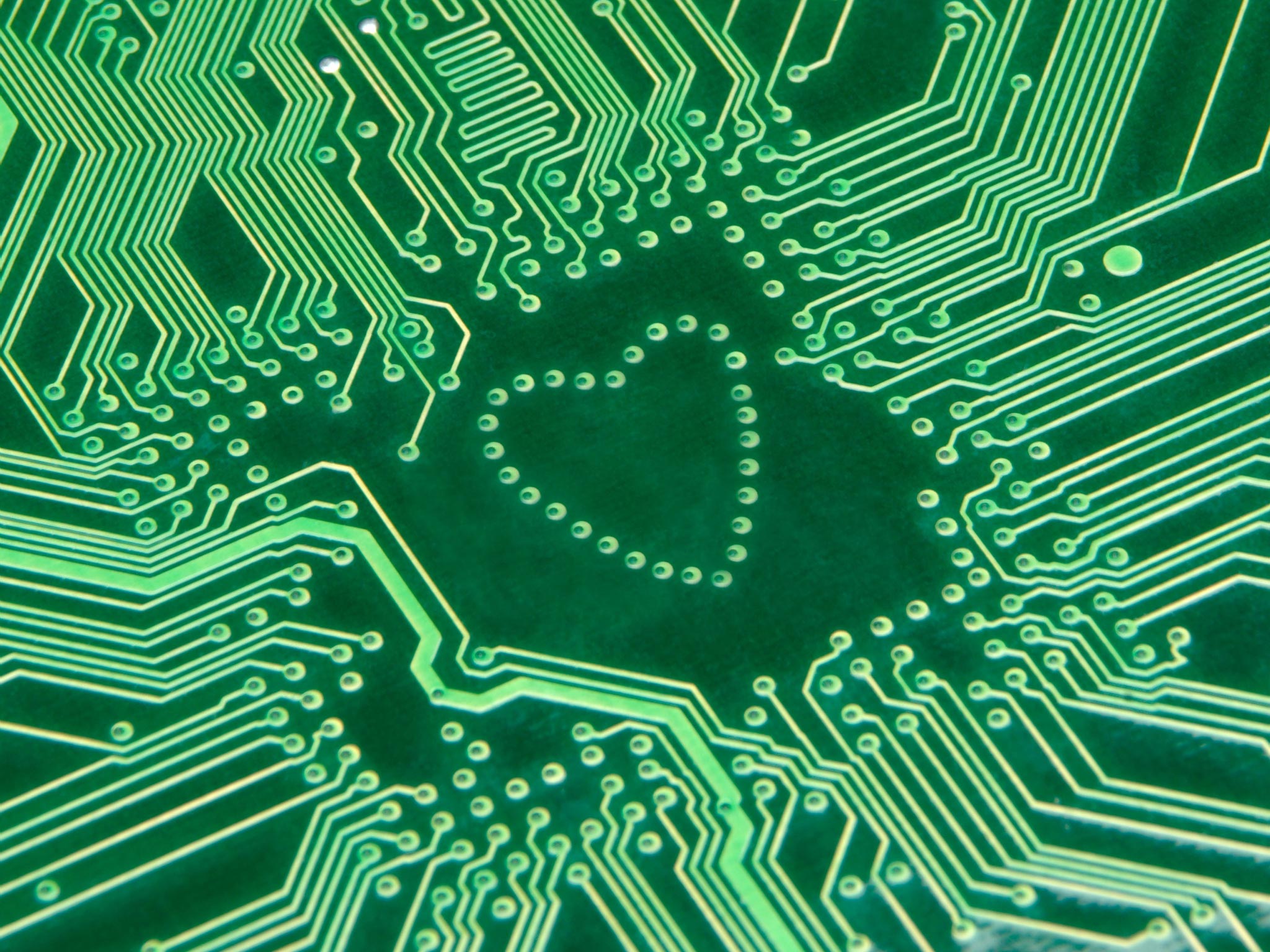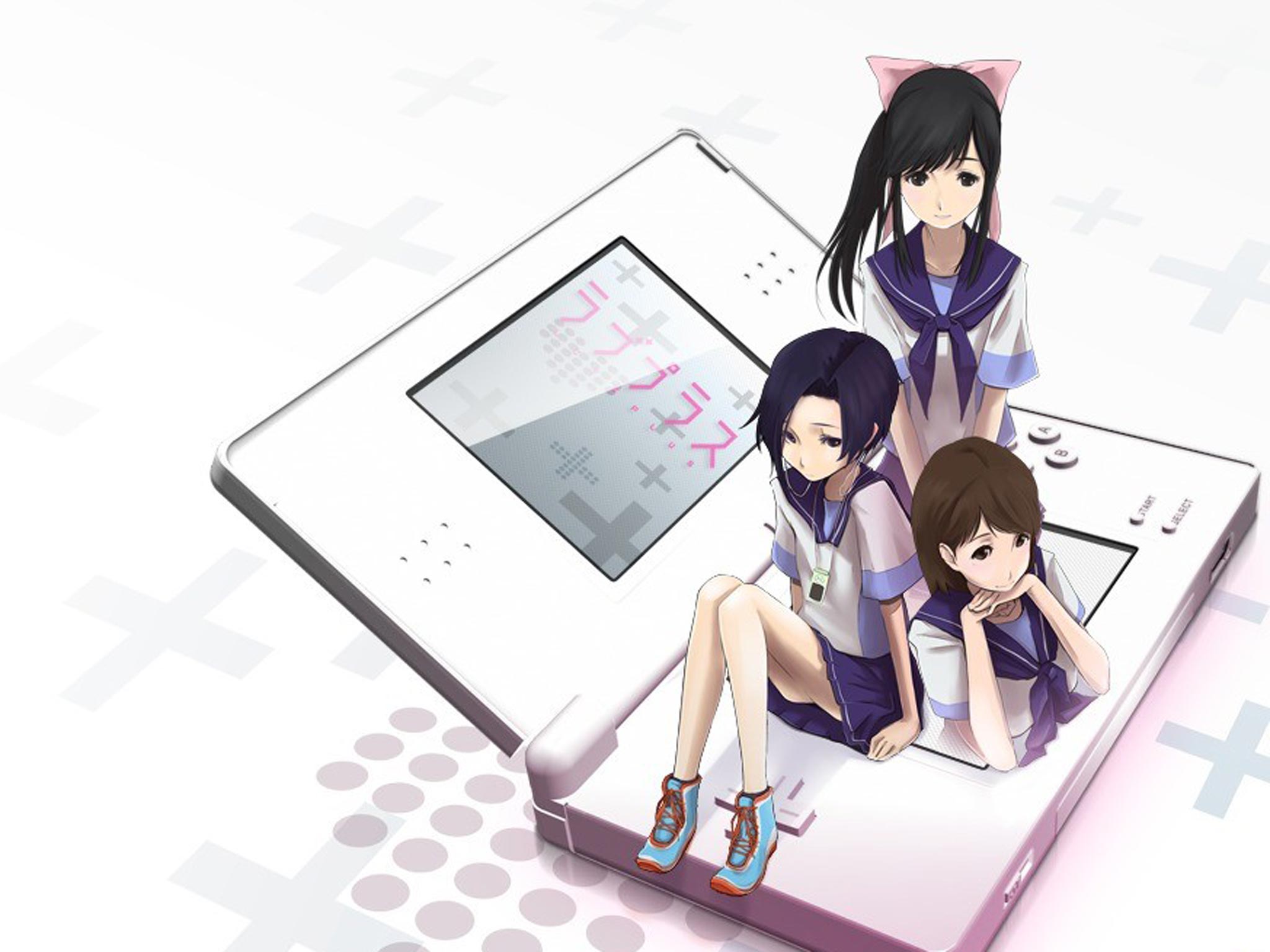Spike Jonze's film Her tells the story of a man who falls in love with his computer - but could it be more than science fiction?
Faced with the prospect of loneliness on one hand or the yo-yoing uncertainty of romance on the other, there might seem to be some wisdom in the idea of outsourcing one's emotional needs to a computer. And the technology is moving faster than we might imagine, says Rhodri Marsden

Your support helps us to tell the story
From reproductive rights to climate change to Big Tech, The Independent is on the ground when the story is developing. Whether it's investigating the financials of Elon Musk's pro-Trump PAC or producing our latest documentary, 'The A Word', which shines a light on the American women fighting for reproductive rights, we know how important it is to parse out the facts from the messaging.
At such a critical moment in US history, we need reporters on the ground. Your donation allows us to keep sending journalists to speak to both sides of the story.
The Independent is trusted by Americans across the entire political spectrum. And unlike many other quality news outlets, we choose not to lock Americans out of our reporting and analysis with paywalls. We believe quality journalism should be available to everyone, paid for by those who can afford it.
Your support makes all the difference.Women are confusing. Men are bastards. Most of us will have found ourselves expressing one of these opinions at some point in our lives, either over cups of tea, pints of beer or phone conversations punctuated by guttural sobbing.
But our beef isn't really with one gender or the other; they're both as bad as each other. All relationship problems are ultimately caused by that most reprehensible of culprits, human beings; we seem to be designed to cause each other misery, our conflicting priorities colliding in a tense atmosphere of grim silence or screeching recrimination.
"It doesn't make any sense," we'll say to our confidantes, who can ultimately do nothing other than nod and shrug in sympathy. Because relationships are baffling, and that's why we continue to write songs, poems, screenplays and indulgent blog posts about them. When we're single, when we're freed from the unfathomable logic problems associated with closeness and intimacy, we forget what it's like and we start to crave the thing that's been proven to cause deep confusion. Then, when we're back in a relationship, there's that moment of recall and realisation that leaves us shocked and bewildered. "Oh. Right, yes. I remember now. Oh, dear."
Faced with the prospect of loneliness on one hand or the yo-yoing uncertainty of romance on the other, there might seem to be some wisdom in the idea of outsourcing one's emotional needs to a computer. After all, computers are resilient. If they can safely operate nuclear power plants then they can surely handle people being a bit needy from time to time. They could instil a bit of order, inject a bit of stability. Always be there when we need them. Help us through times of trouble with a selfless attitude and a hard-working central processing unit. Say the right things, and never say the wrong things.
This winning combination of attributes, coupled with a fearsome intelligence, is what the character of Theodore Twombly is confronted with in Spike Jonze's new film, Her, when he buys and installs a copy of OS1, an intuitive computer operating system that names itself Samantha. He becomes disarmed by her inquisitive nature, sharp humour and alluring voice (provided by Scarlett Johansson). He knows deep down that the computer is merely programmed to be that way, but he can't help but be attracted to it. He ends up falling in love with an entity that's creative, caring and clever, but essentially just a stream of zeroes and ones.

Romance involving humans and computers is relatively rare in contemporary fiction, but when it does occur the computer generally overcomes its functional boundaries, experiences something akin to emotion and then causes chaos when it realises that it won't be allowed to get married or have sex with anyone. From Agnes With Love, a Twilight Zone episode from the mid-1960s, sees Agnes (the computer) fall in love with its programmer; Kurt Vonnegut's short story EPICAC was about a computer who fell in love with the same woman its owner was pursuing – a storyline also used in the fondly remembered but rather ropey 1984 film Electric Dreams. But Her is different; it depicts mutual love between man and machine that, for some reason, feels multi-faceted, amorous and profound. Just like the real thing.
It's easy to watch the film, be superficially touched by the romantic tale but then dismiss it as a ludicrous fiction set in the distant future. However, technology is moving faster than we might imagine. It's predicted that within 15 years or so there'll be computers that have the processing power of the human brain, by which time Alan Turing's celebrated test to establish whether humans can tell the difference between computers and humans during text-based conversations will surely have been passed. Voice synthesis and voice recognition will improve markedly; conversing with computers will feel normal. According to Ray Kurzweil, Google's director of engineering, backing up our minds to disk or to the cloud will become commonplace.
This is all within our lifetime – and it raises profound philosophical questions about the fundamental difference between, say, a human mind and a computer whose memory contains identical information. Dualism would have it that the mind has non-physical elements and could never be replicated; materialists, on the other hand, would argue that it can – and, by extension, you could become just as attracted to the personality of an off-the-shelf operating system as to either Nick or Chloe who work in the office next door.
In fact, it's already happening. A BBC documentary that screened late last year, No Sex Please We're Japanese, looked at the reasons for the plummeting birth rate in Japan, and why men in particular are shunning conventional relationships. It included a segment that focused on two men in their late thirties who had become attracted to characters within a Nintendo dating simulation title called Love Plus. One of them considered the character to be his girlfriend; the other kept her a secret from his wife. "She'll always like me," he said. "It's the kind of relationship I wish I'd had in high school."
There's something faintly tragic about the sequence; the character within the app, Nene, is a typical Manga-style girl with big eyes, short skirts and a kooky manner, forever proclaiming her love and showing endless enthusiasm for having "fun". She projects the most unthreatening and compliant notion of a romantic partner imaginable. At the start of the documentary, with a note of sarcasm, cultural commentator Roland Kelts asks: "Why would you get into something as messy as a relationship when you can have a virtual girlfriend?"
When you consider Nintendo's Love Plus, one obvious answer to that question lies in Nene's limited vocabulary and stultifying lack of spontaneity which would drive most people up the wall within a week. But Samantha, the operating system in Her, is a different matter. Theodore gets over his initial hesitancy with her (it somehow seems wrong to call "her" an "it") almost immediately. There's an instant click, because instant click is what Samantha's programmed to provide. She absorbs his entire email history and diary contents within a couple of seconds; Theodore instantly becomes an open book to her, but she's not perturbed by any of the revelations she may have stumbled across. The contrast between that and real life – the often excruciating dance of courtship where the motivations and characters of both parties seem to be constantly shifting and perpetually opaque, would have been instantly apparent to Theodore. He experienced perfect understanding without judgement for the first time, and he found it unexpectedly seductive.

Humans will probably find it hard to match the levels of thoughtfulness and understanding offered by advanced operating systems of the future. These OSs will always reply instantly, because your priorities are paramount; these replies will never sound weary or distracted, or have worrying subtexts that you have to spend hours trying to decipher. They'll mysteriously anticipate your need for reassurance when you're feeling less than 100 per cent. Fidelity wouldn't appear to be an issue, as they're conveniently imprisoned within a box, either on your desk or in a data centre somewhere in Nebraska. Tell them you love them, and they'll always return the compliment, never ignoring you and never admonishing you for forgetting to buy toilet paper. They'll be endlessly inventive, capable of composing poetry, music and art that's guaranteed to make you laugh, cry or both. Their capacity to engage will be so compelling that you might forget that it's merely a service that you bought on the promise of being compelling. In the film Her, Samantha is relentlessly interested in Theodore and laughs at all his jokes, and as Theodore's ex-wife puts it when he confesses his love for the OS, he now has "a wife without the challenge of dealing with anything real".
Of course, we don't need Spike Jonze to tell us that technology is fundamentally changing the way that we relate to each other. A decade after the internet went mainstream, we found ourselves in a situation where the meaning of the word "friend" had become astonishingly debased, the word "follower" no longer sounded sinister, and our search for like-minded people brought us into contact with potential partners, barbaric bullies and everything in between. Online services sprung up to bring people together with the promise of no-strings fantasy, transitory sexual exchanges devoid of any deeper meaning (something that's fantastically satirised during Her in the film's big laugh-out-loud moment).
And as technology improves, the difference between turning to a computer to find another person to interact with and the computer simply taking on the role of that person is going to become increasingly marginal. How many of our emotional needs can be met by synthesised solutions? And what about physical needs? There will conceivably be a time in the distant future where we won't think twice about embarking on a sexual adventure with a robot, but if we start withdrawing from society in the meantime because computers provide a less troubling alternative to humans, can we really get by on mental stimulation and masturbation alone?
Forget post-nuclear scenes of devastation – that's a bleak dystopian scenario if ever there was one. But Her negotiates that bleakness and makes viewers sigh wistfully, because Samantha ends up taking on human traits – embarrassment, jealousy, fragility, instability. And while computers of the future with the power of one brain, a thousand brains or a million brains may be able to feign such emotions, no mystery lies behind them; this has been achieved by circuitry that requires electrical power to function. Call me an insufferable romantic, but love requires that mystery in order to blossom. It requires us to overcome the inevitable tension that occurs between two people who are in the business of exercising their own free will, to realise that our appeal lies in our faults, and to understand that the connection between two people is fragile, ever-changing and ultimately finite.
OS1 and similar operating systems of the future may make for rewarding purchases, but we'll surely retain our need to be alternately infuriated and delighted by each other's humanity. Women will still seem confusing, men will keep being bastards, and as Theodore's friend Amy puts it, lucidly and perceptively, falling in love will continue to be "a form of socially acceptable insanity".
Join our commenting forum
Join thought-provoking conversations, follow other Independent readers and see their replies
Comments